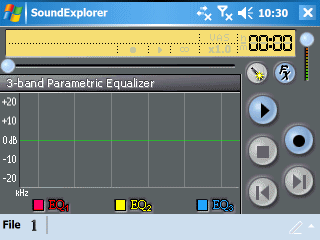The New York Times’ technology writer, David Pogue, savaged the recently released T-Mobile Shadow (titled Reach for Apple, Falling Short). His summary starts with: Frankly, Windows Mobile 6 is a mess. I’ve taken my shots at Windows Mobile. But, I’m still a Windows Mobile fan (though a critical one). So, let’s take a look at Mr. Pogue’s points one at a time.
DP: First of all, a cellphone should not display a “wait†cursor. Ever. And definitely not almost every time you change screens, as on the Shadow.
Hard to argue with this one. Score 1 for Mr. P.
DP: If your Web browser can’t play Flash videos, it should just say so.
Um, since he is directly comparing it to the Apple iPhone, let’s point out that the iPhone and iPod touch do not support Flash at all. That is why there is a custom YouTube app instead of simply being able to view YouTube in the Safari browser. At least Flash is available for Windows Mobile. So, the score is 1 to 1.
When you’re finished looking at a text message, you should not have to open a menu to find the Delete command.
Agreed, 2 to 1.
When you’re on a phone call, you should not have to open a menu to find the Speakerphone command.
Hmm. On most Windows Mobile devices, pressing and holding the Talk button places you in speakerphone mode. This, of course, is not intuitive. So, the score is 2.5 to 1.5.
When you take a picture, you should not have to open a menu to find Send and Delete.
On my phone, the Send option is the left softkey when viewing the photo just taken. Will mostly agree about needing to open a menu to delete. But, how often do I need to delete a photo right after taking it? Let’s split this point too: 3 to 2.
A cellphone should not have a Task Manager. You should never have to worry about quitting programs because you’ve used up too much memory.
This is an interesting topic with a long and heated history. The issue is a long held Microsoft design philosophy that the Windows Mobile memory manager should manage application memory and not let users close an application like they do on a desktop. The problem is that this philosophy has never mirrored reality: Windows Mobile memory management often fails to do its job adequately (to say it politely). I’ll give Mr. P. the point for this one: 4 to 2.
A cellphone should auto-format phone numbers with parentheses and hyphens when you enter them in the address book.
OK, David lost me here. Why is an auto-format needed while entering a phone number into Contacts? And, phone number are formatted with parens and hypens upon completion. So, 4 to 3.
When the cursor is in a number box, like ZIP code, the keyboard should automatically start typing numbers.
Agreed!: 5 to 3.
If the phone has a navigation wheel, the big, clickable center button should always mean “O.K.†Always.
Hmm. I could have sworn this is the case. But, it may be different on the Shadow. So, 6 to 3.
When you’re assigning a contact to one of the five “My Faves†slots, a T-Mobile calling plan that gives you unlimited calls to your five favorite numbers, three confirmation screens is two too many.
67 to 3. [Correcting this typo and carrying it through below because I missed it the first time around]
If it takes four presses on the More button just to see everything in the Start menu — and you provide no direct way to get to the first page from the last — you need to redesign.
Hmm. Again, if we look at it from his comparison with the iPhone,then, well, the iPhone simply doesn’t have 3rd party apps (without Jailbreak, anyway). And, the iPhone doesn’t have nearly as many functions as a Windows Mobile Smartphone (Word, Excel, PowerPoint, etc.). I agree the menu system needs improvement. But, even my iPod classic wheel takes a lot of thumb twiddling to get around. So, 67 to 4.
A locking feature, which prevents the buttons from being pushed accidentally in a purse or pocket, is nice. But it should be optional. And one button press should suffice to unlock it; two in sequence is just annoying.
Press and hold the End Call key to lock a WiMo Smartphone. One button press by my count. My iPod touch is always turning its screen on because it doesn’t truly lock like non-touch iPods. The scheme on WiMo is fine: 67 to 5.
Let me add one more thing before concluding this blog entry. Take a look at the T-Mobile Shadow product page. Do you see any indication whether this is a Windows Mobile Professional Edition (Pocket PC Phone Edition) or Smartphone (Standard Edition)? I don’t see anything other than Windows Mobile mentioned. The average non-techie is not going to have a clue what this thing is. David Pogue doesn’t mention this either. So, carriers, journalists, and the general public are totally ignoring these two very different devices (Pocket PC vs. Smartphone). The Microsoft branding message is DOA. It never gets past Microsoft itself. And, I recall even its own web properties mangle this message sometimes. This needs to be fixed. BTW and FYI, the T-Mobile Shadow is a Windows Mobile 6 Standard Edition device (aka Smartphone).
To sum up then, IMHO,NYT’s David Pogue’s criticisms are 54.5%58.33% on target. That would be great for a batting average or basketball field goal percentage. But, for a well-respected technology commentator… Well, you be the judge…
